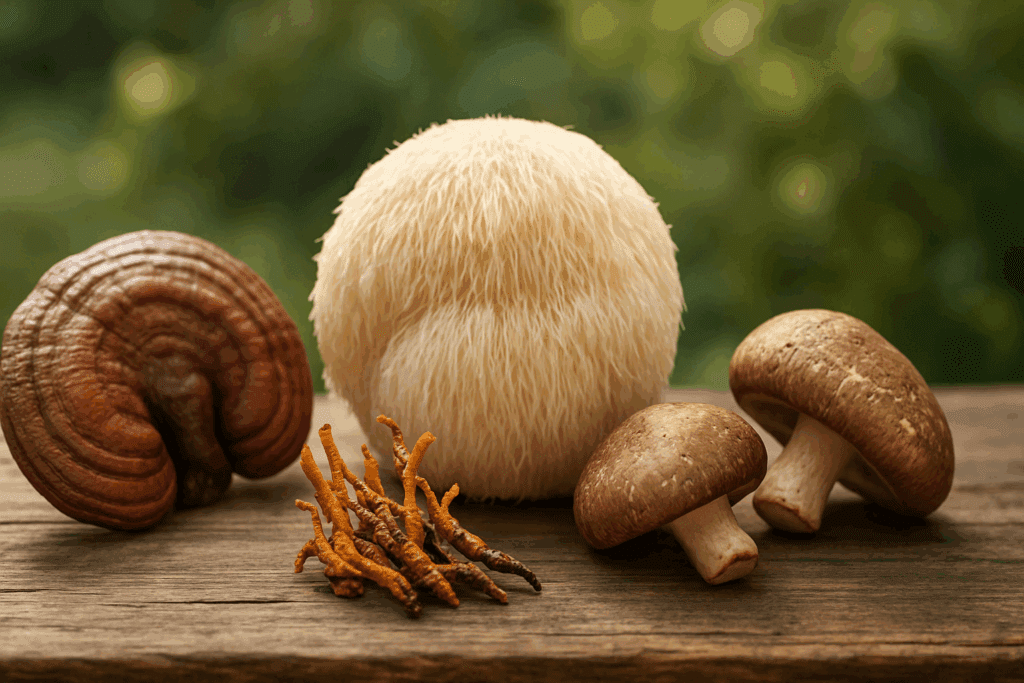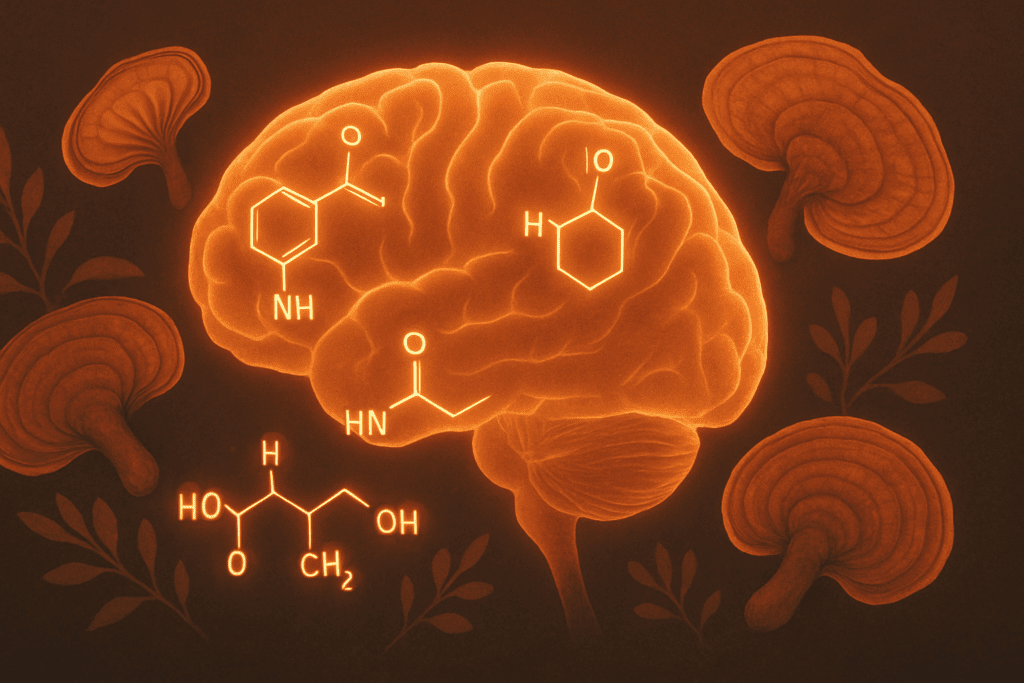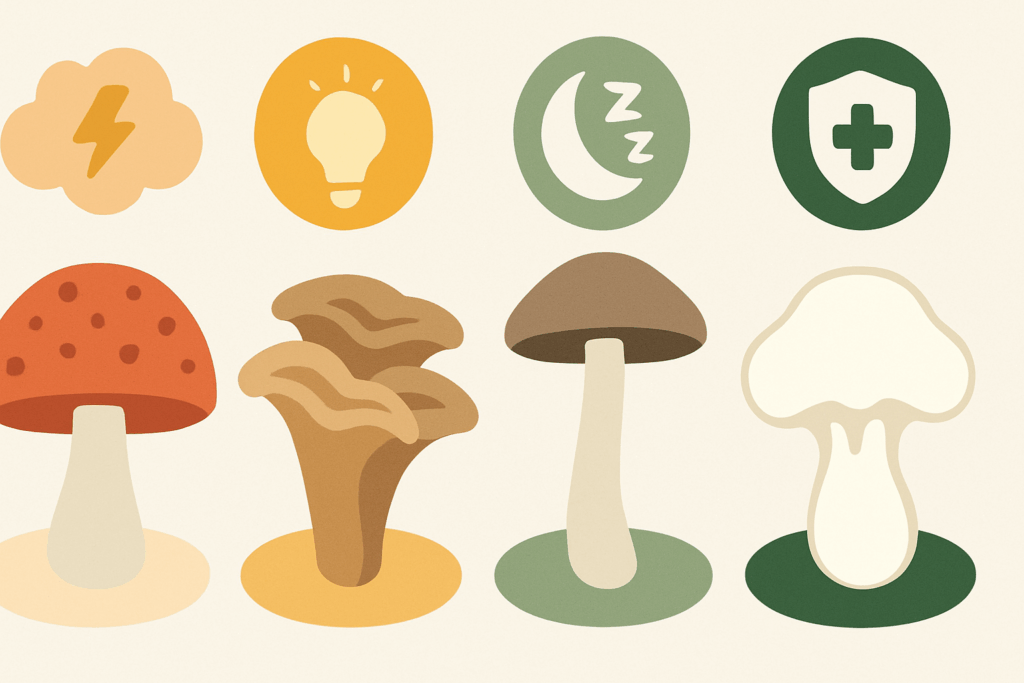In today’s fast-paced world, anxiety has become a widespread concern, affecting millions across various demographics. As people seek safer, natural alternatives to manage their stress levels, interest has grown in the use of herbal and functional remedies, particularly those rooted in traditional medicine. Among these, the use of reishi mushroom for anxiety has garnered increasing attention for its reputed calming properties and adaptogenic potential. Reishi mushroom, also known as Ganoderma lucidum, has long been a staple in Eastern medicine, and modern research is beginning to validate many of the health claims attributed to this intriguing fungus.
You may also like: The Essential Guide to Reishi Mushroom Benefits: How to Use Reishi Mushroom Powder for Stress Relief and Adaptogenic Support

Understanding Adaptogenic Mushrooms and Their Role in Stress Regulation
Adaptogenic mushrooms represent a unique category of natural remedies that help the body resist various stressors, both physical and psychological. Unlike conventional medications that target specific symptoms, adaptogens support the body’s overall resilience, working through mechanisms such as hormonal balance, immune modulation, and neurotransmitter regulation. Adaptogenic mushrooms, including reishi, lion’s mane, and cordyceps, are gaining popularity not only in traditional herbal circles but also among modern wellness enthusiasts and medical researchers.
The term “adaptogen” was first coined in the mid-20th century by Soviet scientists studying substances that could enhance endurance and recovery in soldiers and athletes. Adaptogenic mushrooms benefits include improved stress response, enhanced mental clarity, better sleep quality, and immune support. These benefits stem from the mushrooms’ bioactive compounds, such as triterpenoids, polysaccharides, and peptidoglycans, which interact with various biological pathways. Functional mushrooms and adaptogens are now being explored in clinical settings to determine their efficacy in managing chronic stress and promoting emotional well-being.

What Makes Reishi Mushroom a Standout Adaptogen?
Reishi mushroom holds a revered place among adaptogenic mushrooms due to its wide range of pharmacological properties. Traditionally known as the “mushroom of immortality,” reishi has been used for over 2,000 years in China, Japan, and other parts of Asia. It is especially valued for its calming effects on the nervous system, which makes it particularly suited for those seeking relief from anxiety and stress-related disorders.
One of the key features of reishi mushroom adaptogen qualities lies in its ability to modulate the hypothalamic-pituitary-adrenal (HPA) axis, which plays a central role in the body’s stress response. Chronic activation of the HPA axis can lead to elevated cortisol levels, sleep disturbances, and a compromised immune system. Reishi’s adaptogenic effects help to normalize this response, leading to a more balanced physiological state. Additionally, reishi contains bioactive compounds such as ganoderic acids and beta-glucans that have demonstrated anxiolytic and neuroprotective effects in preliminary studies.

Exploring the Science Behind Reishi Mushroom for Anxiety Relief
When discussing the use of reishi mushroom for anxiety, it is important to delve into the scientific evidence that supports its use. Although most of the existing research is preliminary or based on animal studies, the results are promising and suggest multiple pathways through which reishi exerts its calming effects. One mechanism is through the modulation of gamma-aminobutyric acid (GABA), the primary inhibitory neurotransmitter in the brain. GABA plays a crucial role in dampening neuronal excitability and promoting relaxation.
Reishi may also influence serotonin and dopamine levels, two neurotransmitters involved in mood regulation. By supporting a balanced neurotransmitter profile, reishi contributes to a more stable emotional state. Some studies have even indicated that reishi extracts can reduce symptoms of anxiety in rodents subjected to stress-inducing conditions, pointing to the mushroom’s potential as a natural anxiolytic. While more human clinical trials are needed, anecdotal evidence and centuries of traditional use lend additional support to these findings.
Adaptogenic Reishi and Its Impact on Sleep and Mood
One of the most notable benefits associated with reishi is its positive effect on sleep quality. Sleep disturbances often accompany anxiety disorders, creating a vicious cycle that further exacerbates mental health issues. Reishi’s sedative properties can help individuals fall asleep more easily and experience deeper, more restorative sleep. This, in turn, supports better emotional regulation and a reduced stress response.
Reishi’s impact on sleep may be linked to its influence on circadian rhythms and melatonin production. Some compounds in reishi may enhance the body’s natural production of melatonin, a hormone that regulates sleep-wake cycles. This makes reishi a valuable ally for those dealing with insomnia or irregular sleep patterns. By improving sleep, reishi indirectly helps to reduce the symptoms of anxiety, highlighting the interconnected nature of physical and mental health.
The Broader Landscape of Functional Mushrooms and Adaptogens
While reishi often takes center stage in discussions about stress relief, it is important to acknowledge the broader ecosystem of functional mushrooms and adaptogens that complement and enhance its effects. Lion’s mane mushroom, for example, is well-known for its cognitive-enhancing properties, which can support mental clarity and focus in times of stress. Cordyceps, another adaptogenic mushroom, boosts energy and physical performance, making it useful for those whose anxiety is accompanied by fatigue or low stamina.
Together, these mushrooms form a synergistic blend that addresses various dimensions of the stress response. Integrative health practitioners often recommend combining reishi with other functional mushrooms and adaptogens for a more comprehensive approach to anxiety management. This multi-faceted strategy aligns with the holistic principles of traditional medicine, which emphasize balance and the interdependence of bodily systems.

Reishi Mushroom Elixirs: A Convenient and Effective Delivery Method
One of the most popular ways to consume reishi mushroom today is through mushroom elixirs. These are beverages or supplements that combine reishi extract with other supportive ingredients such as ashwagandha, turmeric, or chamomile. The growing popularity of mushroom elixir benefits lies in their convenience, palatability, and ability to deliver a concentrated dose of adaptogenic compounds.
Elixirs can be consumed as teas, tinctures, powders, or even ready-to-drink formulations. When selecting a reishi elixir, it’s essential to look for products made from fruiting bodies rather than mycelium, as the former contains higher concentrations of active compounds. Additionally, the method of extraction matters; dual-extraction processes that use both water and alcohol yield a broader spectrum of bioactives. For those seeking a natural, enjoyable way to incorporate reishi into their daily routine, elixirs offer a compelling solution.
Addressing Common Concerns: Are Adaptogenic Mushrooms Safe?
Safety is a valid concern when considering any supplement, and many individuals rightly ask, “Are adaptogenic mushrooms safe?” Fortunately, reishi and other adaptogenic mushrooms have a long history of use and are generally considered safe when consumed in appropriate doses. That said, as with any bioactive substance, individual responses can vary. Potential side effects of reishi include digestive upset, dizziness, or allergic reactions in sensitive individuals.
It is also important to consider potential interactions with medications. Reishi may have anticoagulant effects, which could amplify the impact of blood-thinning medications. Pregnant and breastfeeding women, as well as individuals with autoimmune disorders, should consult a healthcare provider before using reishi or any adaptogenic supplement. When used responsibly and under professional guidance, the benefits of adaptogenic mushrooms can be accessed safely and effectively.

Do Adaptogenic Mushrooms Work? What the Research Says
A common question that arises is, “Do adaptogenic mushrooms work?” While more extensive, high-quality human clinical trials are needed, existing studies and centuries of traditional use provide a compelling case for their efficacy. Laboratory and animal research has shown that adaptogens can modulate stress hormones, reduce inflammation, and enhance cognitive function. In particular, reishi has demonstrated anti-anxiety, antioxidant, and immunomodulatory properties.
Clinical trials are beginning to explore these benefits in more depth. For example, some studies have examined the effects of reishi on individuals with neurasthenia, a condition characterized by fatigue, irritability, and poor concentration. Participants reported improvements in mood and energy levels after taking reishi supplements. While these findings are preliminary, they support the broader body of evidence suggesting that adaptogenic mushrooms offer meaningful benefits for stress management and mental health.
Demystifying Reishi Mushroom Psychedelic Misconceptions
As interest in mushrooms grows, so too does confusion around their classification and effects. A common misconception is that reishi mushroom is psychedelic, similar to psilocybin-containing species. However, reishi mushroom psychedelic properties are nonexistent. Reishi does not contain any psychoactive compounds that alter perception or consciousness. Its effects are subtle and cumulative, manifesting as improved mood, sleep, and resilience over time rather than immediate, mind-altering experiences.
Understanding this distinction is important for individuals who may be hesitant to try reishi due to concerns about altered states or legality. Unlike psychedelic mushrooms, reishi is legal in most countries and available as an over-the-counter supplement. Its safety profile and non-intoxicating nature make it a suitable option for daily use, especially for those seeking natural support for anxiety without the risks associated with psychoactive substances.

Integrating Reishi Mushroom into Your Daily Routine
Incorporating reishi mushroom into your daily wellness routine can be both simple and rewarding. Whether you choose capsules, tinctures, teas, or elixirs, consistency is key to experiencing its full range of benefits. Begin with a low dose and gradually increase it to assess tolerance and response. Many users report noticeable improvements in mood and sleep within a few weeks of regular use.
Timing also matters. Because reishi has calming effects, it is often best taken in the evening or before bedtime. Pairing it with other calming practices such as meditation, journaling, or gentle yoga can amplify its impact. For those interested in a more comprehensive approach, combining reishi with other adaptogenic mushrooms and herbs can create a synergistic blend that addresses multiple aspects of anxiety and stress.
Personal Experiences and Anecdotal Evidence
While scientific research provides a valuable framework, personal stories can also shed light on the potential benefits of reishi. Many individuals who incorporate reishi into their wellness routine report a greater sense of calm, reduced irritability, and improved sleep. These anecdotal accounts, while not a substitute for clinical data, offer real-world insights into how adaptogenic reishi may support mental and emotional well-being.
Testimonials often highlight the transformative effects of reishi when used consistently over time. Users frequently describe it as a gentle but profound ally that helps them navigate daily challenges with greater ease and emotional balance. These personal narratives echo the traditional uses of reishi in Eastern medicine, where it has long been revered as a tonic for the spirit as well as the body.
Choosing High-Quality Reishi Products
With the growing popularity of reishi, the market has become saturated with products of varying quality. To ensure efficacy and safety, it is important to choose reputable brands that prioritize purity, transparency, and sustainability. Look for products that clearly state the part of the mushroom used (preferably fruiting body), the extraction method, and third-party testing for contaminants.
Avoid products with unnecessary fillers or synthetic additives, and opt for organic or wild-harvested options whenever possible. Companies that practice ethical sourcing and provide detailed information about their manufacturing processes tend to offer more trustworthy products. Investing in a high-quality supplement not only maximizes the potential benefits but also reduces the risk of adverse effects.
Frequently Asked Questions About Reishi Mushroom for Anxiety and Adaptogenic Benefits
How long does it take for reishi mushroom for anxiety to show noticeable effects?
Reishi mushroom for anxiety typically requires consistent use over several weeks to produce noticeable results. Unlike fast-acting pharmaceutical medications, reishi works gradually by supporting the body’s natural ability to adapt to stress. Many users report subtle changes within the first one to two weeks, including a general sense of calm and improved sleep quality. However, the full benefits, particularly regarding anxiety relief, are often most evident after three to six weeks of continuous supplementation. It’s important to view reishi as part of a long-term wellness approach rather than a quick fix, especially when integrating it with other functional mushrooms and adaptogens.
What sets reishi adaptogen properties apart from other adaptogenic mushrooms?
Reishi adaptogen effects are uniquely focused on promoting calm, emotional balance, and deep sleep. While other adaptogenic mushrooms like cordyceps and lion’s mane are more associated with physical stamina and cognitive enhancement, reishi targets the parasympathetic nervous system. This makes it especially effective for individuals dealing with chronic anxiety or high levels of stress-related fatigue. Additionally, reishi contains specific triterpenes and ganoderic acids that modulate the hormonal response to stress, which is less pronounced in other adaptogens. These distinctions make reishi an ideal foundation for anyone building a daily adaptogen mushroom regimen focused on relaxation and emotional regulation.
Can reishi mushroom be safely used alongside conventional anxiety treatments?
Yes, reishi mushroom can often be used as a complementary therapy alongside conventional anxiety treatments such as cognitive-behavioral therapy (CBT) or selective serotonin reuptake inhibitors (SSRIs). However, because reishi may interact with medications that affect blood clotting or immune function, it’s essential to consult with a healthcare provider before beginning supplementation. Integrating reishi into a broader wellness strategy can enhance resilience and recovery, but professional supervision ensures safety and avoids counterproductive interactions. In some cases, combining adaptogenic mushrooms with therapy may improve adherence and motivation, as the individual experiences incremental gains in energy and mood. Always personalize such combinations based on medical history and professional guidance.
Are adaptogenic mushrooms safe for long-term use, and what should users monitor?
The question of “are adaptogenic mushrooms safe” is common among new users, and the answer is generally affirmative for most healthy individuals. Long-term use of reishi and other adaptogenic mushrooms is considered safe when doses are within recommended guidelines and the source is of high quality. However, users should remain vigilant for any signs of gastrointestinal discomfort, skin irritation, or sensitivity reactions. It’s also wise to monitor how the body adapts over time; occasionally cycling off or alternating with other adaptogens can help maintain their effectiveness. As with any supplement, safety is tied to quality and consistency, so it’s important to source from reputable brands with transparent extraction processes.
What makes reishi mushroom elixirs particularly effective or enjoyable to consume?
Mushroom elixir benefits extend beyond convenience—they provide a flavorful and versatile method for daily reishi intake. Many elixirs combine reishi with complementary adaptogens such as ashwagandha or calming herbs like lemon balm, which enhances both taste and functional synergy. Drinking an elixir also creates a moment of intentional wellness in the day, reinforcing routine and relaxation. Unlike capsules, elixirs engage the senses and can be customized with warm or cold beverages, often making them more enjoyable for people who dislike swallowing pills. Additionally, liquid extracts in elixirs may offer faster absorption and broader bioavailability of key reishi compounds.
Is reishi mushroom psychedelic or capable of causing altered states of consciousness?
Despite widespread misconceptions, reishi mushroom psychedelic effects do not exist in the pharmacological sense. Reishi lacks the psychoactive compounds such as psilocybin that are found in hallucinogenic mushrooms. What users might experience is a deep sense of tranquility or mental clarity, which could be mistakenly associated with altered states. However, these sensations are more aligned with a balanced nervous system rather than intoxication. Clarifying that reishi is non-psychoactive reinforces its suitability for regular, daytime use and distinguishes it clearly from substances associated with recreational or ceremonial use.
How does adaptogenic reishi support emotional resilience during periods of chronic stress?
Adaptogenic reishi plays a strategic role in helping the body buffer against the negative effects of prolonged stress. By modulating the HPA (hypothalamic-pituitary-adrenal) axis, reishi reduces the overproduction of cortisol, a hormone linked to anxiety and fatigue. Over time, this physiological adjustment can restore hormonal balance and reduce emotional volatility. Moreover, the antioxidant properties of reishi may counteract oxidative stress, which is often elevated in individuals experiencing chronic emotional strain. This dual action—hormonal modulation and cellular protection—gives reishi an edge in supporting psychological endurance and emotional flexibility.
Do adaptogenic mushrooms work equally well for everyone, or does effectiveness vary?
The question “do adaptogenic mushrooms work” does not have a universal answer, as individual response can vary based on genetics, lifestyle, and current health status. Some people may notice profound benefits within days, while others may need several weeks to detect subtle shifts. Factors such as digestive health, sleep hygiene, and existing stress levels all influence how the body absorbs and responds to adaptogenic compounds. Additionally, some users may find greater efficacy in stacking multiple functional mushrooms and adaptogens tailored to their specific needs. Personalized experimentation, guided by wellness tracking or professional consultation, can help determine the most effective combination and dosage.
What is the role of functional mushrooms and adaptogens in modern integrative medicine?
Functional mushrooms and adaptogens are increasingly being integrated into modern holistic and functional medicine protocols. Practitioners often recommend them as part of a layered approach to managing anxiety, burnout, or autoimmune issues. These substances are valued for their ability to interact with multiple body systems—immune, endocrine, and neurological—without overstimulating any one area. Their adaptogenic qualities make them particularly useful in addressing complex, stress-related conditions that do not respond well to single-target pharmaceuticals. Moreover, as research on adaptogenic mushrooms benefits continues to evolve, these natural agents are gaining credibility and acceptance within evidence-based practices.
Practical ways to incorporate reishi mushroom for anxiety into a balanced lifestyle
Incorporating reishi mushroom for anxiety into your lifestyle can be both simple and transformative with a few practical strategies. Drinking a warm reishi tea or elixir as part of a nightly wind-down ritual reinforces its calming benefits while promoting better sleep hygiene. Integrating reishi powder into smoothies, lattes, or even soups allows for flexible, culinary-friendly intake that enhances adherence. Pairing reishi with mindfulness techniques like meditation or deep-breathing exercises can compound its stress-reducing effects. Those with demanding schedules may benefit from taking reishi in capsule form, particularly during high-stress periods such as exams, deadlines, or travel. Establishing consistency and intentionality around its use helps unlock the full spectrum of reishi mushroom adaptogen properties in real-life contexts.
Final Thoughts on the Powerful Benefits of Reishi Mushroom for Anxiety
In the quest for natural solutions to anxiety and stress, reishi mushroom stands out as a powerful, well-rounded ally. Its adaptogenic properties offer a unique ability to modulate the body’s stress response, support neurotransmitter balance, and enhance overall emotional well-being. Unlike pharmaceuticals that often come with unwanted side effects, reishi offers a gentle, cumulative approach that aligns with the body’s natural rhythms.
From improving sleep and mood to promoting long-term resilience, the benefits of reishi mushroom for anxiety are both broad and profound. When integrated into a holistic wellness routine, reishi can serve as a cornerstone of mental and emotional support. As research continues to validate its traditional uses, reishi is poised to become an increasingly respected and relied-upon tool in the modern stress-relief arsenal.
As you consider adding this remarkable fungus to your daily routine, remember to consult with a qualified healthcare provider to ensure it aligns with your individual needs and medical conditions. With thoughtful use and consistent practice, reishi mushroom can be a transformative addition to your journey toward inner peace and balance.
Further Reading:
What Are Adaptogenic Mushrooms? Known Benefits of Functional Mushrooms
